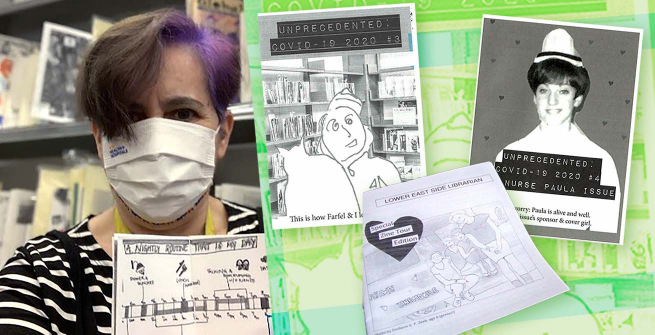Jenna Freedman is the founder and curator of the Barnard Zine Library. She's been making zines for most of the 21th Century, most recently a series about pandemic life called Unprecedented. She writes and speaks on zines and library activism. Other than that, she mostly reads and hangs out with her cats and her person.
How did you get interested in zines?
My zines origin story takes place in the 1990s spoken word poetry scene. I got pieces published in a couple of what I would now call literary zines, which was fun, and made me feel like I had a place in the community, even if I wasn't headlining shows at the Nuyorican Poets Cafe or some other cafe on the Bowery that doesn't exist anymore. Still, there was an energy to literary or lit zines that was if not exactly competitive, less community-minded than the perzines that later captured my heart and head.
I met Celia Perez in library school in 1999, and she gave me one of her zines, maybe an early issue of I Dreamed I Was Assertive. That days-in-the-life glimpse into how Celia saw and processed the world around her showed me how something small could have a...small...impact, and thus have a different kind of power, a more intimate one than an indy anthem or a bestselling book. I made my first zine in 2001 and started the Barnard Zine Library in 2003. Celia and I are still trading zines and letters! Our friendship is enriched by pieces of paper that come in the mail, so much so that we are best friends despite only having lived in the same state for three months.
What are your zines about?
Lol they're often about work a lot of the time because I like working, and I'm pretty dull in real life. I also write about the books I read for the same reason. Sometimes they're about my cats, who, unlike me, are very interesting people even if they sleep 20 hours a day. I've edited or co-edited two compilation zines about menstruation and menopause. I published 14 issues of a "quaranzine," that is a zine created during the pandemic, called Unprecedented. There are also two zines about jury duty, one on what it's like to serve on a grand jury, and one advising abolitionists about why they should want to get picked for a jury.
What are some of your favorite zines and zine makers?
Celia's zines! I also love Joe Hatton's Think About the Bubbles series and Elvis B's minicomics. There are a million more, but I'll need a prompt.
Your zines are in our library collection for patrons to borrow. What do you think about that? (we have four of your zines)
It can feel weird seeing my zine in a library, especially how it's described! But I also know that when I give my zine to a librarian (hi Ziba) that's probably what's going to happen unless I request otherwise. One thing people should know is that most zine librarians are responsive to requests to change how a zine is cataloged. We don't love removing zines from our collections, but we'll do it if the creator really wants us to.
What do you think is the future of zines?
I'm so not a futurist, so I don't have a solid prediction. I see trends and zines evolving as they will. I think the medium will ebb and flow, getting rediscovered every few years as if they're back when they never fully go away.
Why are zines important?
My answer to this question has changed over the years I think. At this moment, I'll say they're important to creators who need an outlet, to readers who feel alone, to any number of subcultures, to history for documenting a time from points of view from people who aren't "notable," to use an archives and Wikipedia term. Today I was identifying zines from the Columbia Libraries (of which the Barnard Library is one) catalog that might fit Barnard College's "Year of Science" initiative. I was surprised and moved by the array of zines I found. There are zines sharing herblore, how to perform a menstrual extraction, critiquing medical practices and sound engineering, experiences with hormone replacement therapy and getting top surgery, a primer on climate disaster, debunking common attitudes about fatness, a comic about weather balloons, and yes, documenting experiences of being a woman in STEM. And more! I could go on! The point of sharing a few of the topics is to show that there is a range of content—created by women, transgender, and nonbinary people, many of whom are also people of color—that expand what I think most people imagine when they hear the phrase "year of science" even from a historically women's college in New York, which is perceived as a liberal city.








